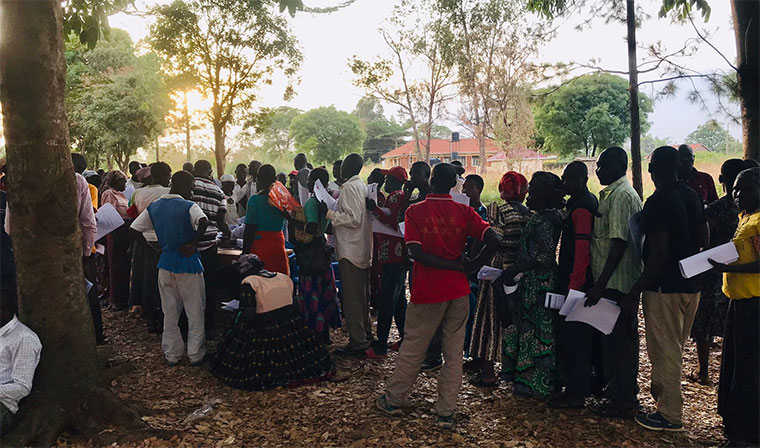OPINION: The Parish Development Model’s (PDM) current design has left many questions unanswered, especially on its ability to stamp out poverty.
Whereas in its current form some quick political dividends may be realised, socio-economic transformation of the poor will be hard to reach with PDM as history has shown with similar programmes and slogans.
Like the earlier programmes of Entandikwa, Prosperity for All, YLP, WEP, NAADs, OWC under the army, Emyooga, etc that failed to deliver on NRM’s socio-economic transformation and liberation agenda, PDM is deceitfully yet tunefully being sold as a sure, special purpose vehicle that will lift many Ugandans out of poverty.
From the onset, the architects made PDM look like a bus to the promised land until MPs were sent home on a PDM monitoring exercise. The oversight visit has helped shade light on the reality of PDM.
To the surprise of many, prior to the MPs being sent on a PDM monitoring exercise, an MP from Western Uganda subscribing to the National Resistance Movement party remarked in one of our parliamentary deliberations that the PDM is a ‘scam.’ Rt. Hon. Speaker’s PDM monitoring directive has now helped to triangulate the MP’s assertion and expose the magnitude of the scam in PDM as a vehicle for wealth creation.
Now in the third quarter of the financial year, some PDM groups are yet to receive PDM Parish Sacco revolving funds under pillar three. By now parish Saccos should have received Shs 75 million on their account but that is not the case. Elsewhere, abuse of some of the PDM resources has been reported.
Indeed, if the target of PDM was an affirmative action for putting money in the pockets of poor households living outside the financial economy, why are PDM resources not prioritising and following the predominantly poor in Karamoja, Acholi, West Nile etc where poverty levels are the highest?
The PDM architects’ refusal to rely on poverty data has led to PDM resources being spread thin. Like past failed poverty eradication programmes, PDM could end up enriching a wrong group due to poor design and corruption, among other factors. PDM was designed and modelled without engagement and input from targeted beneficiaries – the poor people.
Instead, non beneficiaries were consulted, leading to a design based on speculation. The PDM has also never been piloted. Without lessons learnt from earlier experiences, there is little hope that such a rapidly scaled-up programme will succeed. Further to note is that the implementation of PDM’s pillar three commenced without clear guidelines.
The ever-changing PDM guidelines is a sign of a poorly-conceived idea. As a result, confusing messages are being sent to beneficiaries. Coupled with cumbersome paperwork and delayed release of funds, the little initial interest in the model has been shuttered by the small resource envelope of PDM, which is a drop in the ocean.
Despite PDM having seven pillars, there is silence on the funding modality for other pillars. Where will Parish Development Committees get money for things such as infrastructure development, human capital development, etc as envisioned under PDM?
The new guideline under pillar three, which requires individuals to borrow from parish Saccos instead of groups that are more familiar with the behaviour of their members, makes appraisal and recovery of the loans difficult. The requirement for poor households to provide collateral to guarantee their loans is a hurdle designed to limit their participation.
The PDM loan has come with cumbersome paperwork for the target group, making it costly for participants. It is not clear how these costs associated with new changes, cumbersome paperwork and movement expenses will be covered. For instance, the removal of parish chiefs as signatories to parish Sacco accounts led to more paperwork and costs in changing signatories.
Even now, before borrowing, individual beneficiaries are being asked to open new accounts in banks before they can access the money. Some are already facing hurdles in the processing accounts, ranging from lack of national identity cards, illiteracy, distant banking services, costly account opening, old age, disability, etc. Experience has shown that too much signing discourages poor people. There is fear they could abandon PDM altogether.
Not only that, the increment of the PDM loan interests from the earlier communicated 3 per cent to 6 per cent without involving them is the latest shock to beneficiaries. Already, mistrust has been created in PDM as a vehicle for wealth creation and the people who deliver news of the changes.
Coupled with unnecessary delays in the implementation of PDM, lack of alignment with specific conditions of beneficiaries such as weather and untimely release of funds (off season), farmer’s planning will be impacted and their value for PDM diminished.
This compounded by the reduction of the initial loan tenure from one year to 3-6 months, a change that will impact some enterprises like cassava value chain that cannot financially close within six months. Making repayments of PDM loans within reduced new timelines will only serve to bruise beneficiaries, and not lift them up.
Unlike other Saccos, lack of clarity on how individuals or groups will share dividends realised by the parish Saccos is what will continue to make PDM appear like a scam. For as long as the above concerns on PDM are not redressed, Ugandans can as well prepare for the next failed programme.
The writer is a messenger and spokesman of the people of Maracha Constituency.
If you would like your article/opinion to be published on Uganda’s most authoritative news platform, send your submission on: [email protected]. You can also follow DailyExpress on WhatsApp and on Twitter (X) for realtime updates.



